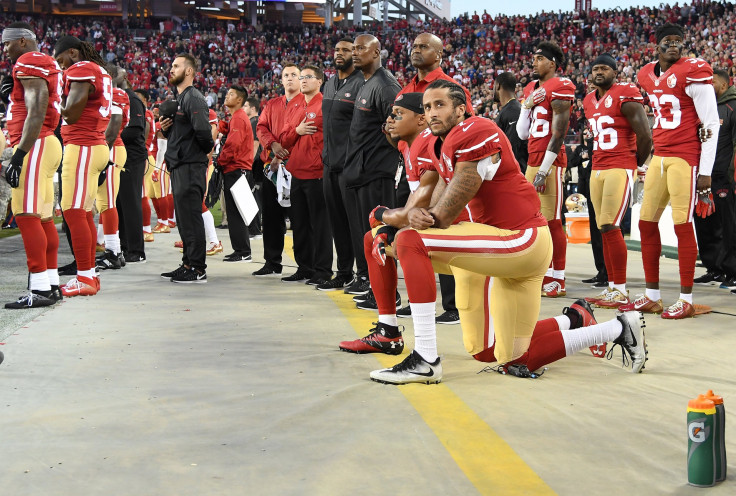Colin Kaepernick News, Contract: After Protest, 49ers Quarterback The Most Disliked NFL Player? Some Critics Cite Salary

San Francisco 49ers backup quarterback Colin Kaepernick has become arguably the most polarizing NFL player after his decision to sit or kneel during the national anthem in protest of racial inequality.
"I am not going to stand up to show pride in a flag for a country that oppresses black people and people of color," Kaepernick said in August. "To me, this is bigger than football and it would be selfish on my part to look the other way. There are bodies in the street and people getting paid leave and getting away with murder."
Kaepernick's protest has come with some backlash. On Tuesday, the 28-year-old said he has received death threats from a "couple different avenues" but is "not too concerned about it."
According to a poll of 1,100 people conducted by E-Poll Marketing Research last week, Kaepernick is "disliked a lot" by 29 percent of the general U.S. population, which was the highest among 350 players.
Randy Parker, strategic marketing executive at E-Poll, said the list was composed of all of the NFL players in their database and used a scale of "dislike a lot" to "like a lot" to measure appeal. In the data, Kaepernick’s “dislike a lot” was at 6 percent two years ago, and his “negative appeal” was previously at 10 percent and is now at 40 percent.
Amongst NFL fans, Kaepernick fares even worse. He previously had a 10 percent “negative appeal” that jumped to 48 percent. His “dislike a lot” went from 6 percent to 36 percent.
The selected consumer comments used to describe Kaepernick included “attention seeking,” “uninformed,” “disrespectful,” “overpaid,” “unpatriotic” and a “jerk.”
One comment read this way: “Since he sat down for the National Anthem, I am not a fan. Yes, it is his right, but what is he really accomplishing? He can kneel or sit, but the poor are still poor and he is still rich. Kneeling doesn’t put food in their mouth.”
Kaepernick's contract has a base salary of $11.9 million in 2016 and includes bonuses. He signed a six-year contract extension in 2014 worth more than $110 million, and with a then-record $61 million guaranteed.
Fox Sports pundit Jason Whitlock described Kaepernick’s protest as a “fad.”
“When you’re a multi-millionaire with a platform as an NFL quarterback, gestures—and that’s all this is, is a gesture—is not what you’re called upon to do. He’s not John Carlos and Tommie Smith. Those guys in the 1960s, when they were making gestures—that was all they could do. They weren’t wealthy. They didn’t have the power or the platform that Colin Kaepernick and these modern-day athletes have.”
But Kaepernick has also received his share of support. Some of the consumer comments included “brave,” “a man with conviction and heart,” and a “good role model.” One commenter described Kaepernick as being “in a tough position right now but got the conversation started.”
Amongst African Americans, Kaepernick's "like a lot" went from 16 percent to 42 percent over two years.
His jersey sales have surged following the protest. In an Instagram post, he said he would donate "all the proceeds I receive from my jersey sales back into the communities."
Kaepernick isn’t fighting the battle alone as other athletes have joined him in his protest. Brandon Marshall of the Denver Broncos, Arian Foster of the Miami Dolphins, and Marcus Peters of the Kansas City Chiefs are just a few of the notable NFL players who have either kneeled or raised a fist during the national anthem. Soccer player Megan Rapinoe, who plays for the U.S. Women's National Team, also knelt during the anthem. Every member of the WNBA's Indiana Fever kneeled during the national anthem before their game on Wednesday, and NBA players are expected to follow suit when the season begins in the coming weeks.
There has also been a call for more action from white football players, a sign that this movement may just be in its early stages.
“You need a white guy to join the fight. The white guy is super important to the fight,” Seahawks defensive end Michael Bennett told the Seattle Times. “For people to really see social injustices, there must be someone from the other side of the race who recognizes the problem, because a lot of times if just one race says there’s a problem, nobody is realistic about it.”
Former NFL quarterback Tim Tebow, who was often commended for his leadership skills as a Heisman Trophy winner at Florida, was asked about Kaepernick on Tuesday at the New York Mets' instructional league Port St. Lucie, Florida. A devout Christian, Tebow grew in fame during the 2011 NFL season for “Tebowing” when he took a knee in prayer.
“The taking a knee?” Tebow said after a workout. “You know I think there’s a lot of people who have thoughts out there. For now, I’m just going to keep mine to myself."
"When people have belief in something, or conviction in something, trying to stand for that is a good thing, and it’s all about standing for it the right way.”
© Copyright IBTimes 2024. All rights reserved.












